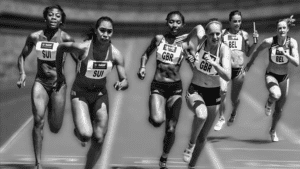Basic Skating For Beginners
For a long time, hockey was unapproachable for young children in America thanks to its lack of popularity, expensive equipment, and harsh learning curve. Comparatively, not only must you learn advanced stick skills and the complex hybrid nature of hockey, but you must also learn how to skate.
Relatively speaking, there is no other sport with such a difficult learning period. If you can’t catch, you can still hit in baseball. If you can’t shoot well, you can play defense in soccer. But hockey? If you can’t skate, you can’t play hockey. So, in order to help with the steep task of learning how to not only stand, but excel on those sharp blades, CoachUp has compiled a list of things to do while beginning to skate so that you don’t end up like the guy below.

Bend Your Knees
Bend your knees deeply in front of your toes so that they’re close to a 90 degree angle. By having a good knee bend, you will develop better balance and a noticeable increase of power in your strides.
Keep Your Head Up
It’s vital that you keep your head up and your eyes forward. Although it may seem to be an obvious tip, many players aren’t conscious of what’s going on around them. Keeping your head down might not allow you to correctly prepare for contact. At the youth level, this is a huge factor in avoiding concussions. In the beginning, it’ll be initially difficult to keep your eyes up instead of down on the puck, but keep working at it. With enough practice, you can improve your stickhandling skills and become much more comfortable you move on the ice.
Fully Extend Your Body
When you’re skating from one end of the rink to the other, it’s crucial that you extend your leg and ankle out to their maximum length during each stride. By doing this, you can attain more speed and be more explosive on the ice. When you’re striding, make sure you avoid bobbing up and down. By developing a smooth, long stride, you’ll also gain better balance.
Wide Strides All Day, Every Day
Whether you’re a beginner or a professional, maintaining proper strides with your feet hip width apart is hugely important in proper skating form. By having your skates too close together you can and will easily lose your balance. Once you’ve reached a decent speed, your strides should be much wider than when you took off. With full extension on both sides, your speed can increase significantly.
Toe Flicks Aren’t Just For Looks
Use your toes to flick or rip the ice — it’s as if you’re pushing off and forward with every stride. Imagine it like a sprinter would, you want to make sure you’re pushing off with your toes at all times to maintain top speed. This will help you significantly in gaining an extra boost of power at the end of each stride.
Make Your Center Of Gravity Your Center Of Attention
Speaking of which, having a low center of gravity and balance is the key factor in many great skater’s successes. The lower you are, the harder you are to move or knock down. Conversely, the higher you are, the easier it is to knock you off balance. Simply put, your balance is everything. This low center of gravity, combined with the bent knees and longer strides, will make you absolutely lethal in terms of directional changes, sturdiness, and overall smoothness.
Get Your Arms Involved
While many believe that fast skating is predicated on swinging your arms side to side, that’s actually incredibly bad for your balance and technique. Instead, by moving your arms in a front-to-back motion, as if you were a dryland sprinter, you’ll propel your entire body forward for a much more effective stride.
Keep Your Stick At The Ready
When watching professionals like Sidney Crosby or Pavel Datsyuk, it’s undeniably clear that they’re always ready for the puck. Even if you’re not expecting a pass, it’s important to always be mentally sharp and ready for one. Additionally, your stick can always be used as a third leg and to prop you up when you need some helpful balance.
(Related: Read about the importance of skating drills here.)
Huddle Up
Learning how to skate for the first time isn’t always an exercise in speed, it’s a battle of simply staying on your feet. For a while, it won’t be easy, in fact, it will be one of the most frustrating endeavors you’ve ever attempted. Fear not, however, because it’s not dissimilar to riding a bike — once you’ve got it, you know it forever.
Take your time and go step-by-step, mastering one aspect before moving onto the next, so as to not overwhelm you! There is no race to become a fast skater, but nailing the fundamentals will help you out there exponentially.
If you take these tips with you the next time you’re on the ice, you’re bound to improve. CoachUp has tons of private trainers that can help you with any specific questions or hiccups along the way. For any struggling athlete, consider booking one of our private trainers to boost your confidence — it could your ticket to success! What are you waiting for?
How useful was this post?
Click on a star to rate it!
Average rating 0 / 5. Vote count: 0
No votes so far! Be the first to rate this post.




